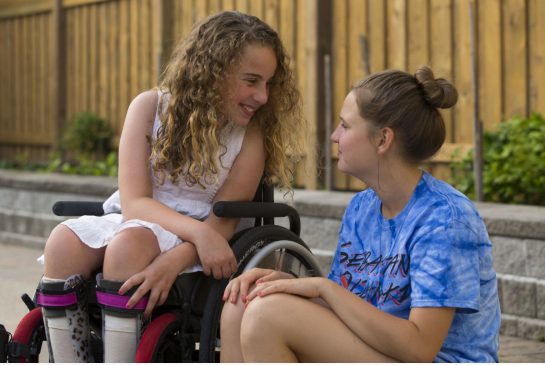Parapan Am Games in Toronto fails to accommodate a Mississauga girl who uses a wheelchair.

Every time Alessia Commisso’s weekly swimming class ends, the 12-year-old Mississauga girl begs to stay in the water just a little bit longer.
Alessia suffers from Leigh’s Disease —a condition causing degeneration of the nervous system and requiring wheelchair and walker use. The pool, her mother Sonia told the Star, is the one place where Alessia “can be like anyone else” because “it gives her freedom.”
But that freedom doesn’t extend to the newly opened Parapan Am Aquatic Centre in Scarborough.
Sonia had hoped to take Alessia and her friend there to watch the upcoming Parapan Am Games competitions, but was told days ago that people needing tickets in an accessible area may be seated with only one of their able-bodied companions.
For a girl with medical issues, too young to be at the competition unaccompanied, that meant Alessia would have to ditch her pal Weronika Rodowicz, 13, for her mom.
It outraged Sonia, who said concert promoters have made exceptions to the rules before, allowing her to snag extra seats in wheelchair accessible areas for her daughter and friends to see sold-out shows put on by Taylor Swift and One Direction.
“For something like this, I thought I would get the extra ticket. It just doesn’t make sense. This is the Parapan Am Games. These are the athletes with disabilities. If they should be accommodating at any event, it is this one,” Sonia told the Star. “My daughter is at that age where parents are embarrassing, and she does not want to be with her mom all the time. She wants a friend to come along.”
Monday afternoon, PanAm spokesperson Kevin Dove told the Star in an email that “the 1:1 ratio of accessible and companion seats is done in order to maximize the number of accessible seats within a venue.”
“In some venues there are existing permanent seats that are fixed at the 1:1 ratio, and in venues where this is not the case, the ratio is applied so that the accessible seating capacity is not eroded,” he said.
When and where possible, he said, friends and family are accommodated in nearby seats.
But later in the day, following questions from the Star, Pan Am officials had changed their tune, saying: “We are planning to follow up with the family. We’d like to see what we can do to make it a positive games experience for the family.”
Sonia said, “I think one or two extra people is not an issue. This is not a 6:1 ratio I am asking for.”
“When you are going out, you want to go out as a group, not as a caregiver and your patient,” she said, noting that the policy would even restrict Alessia and herself from bringing her son along, unless they bought a ticket for her husband, who also uses a wheelchair.
Not being able, because of a restrictive ticket policy, to give her daughter the freedom to go to ticketed events at massive stadiums with whomever she wants, just as her able-bodied friends often do, is “disappointing, frustrating and sad,” she added.
Sonia said it’s hard to hear Alessia say, “Oh, here we go again” every time her mother has to make a case to get an extra ticket, but it’s always worth it to see her daughter smiling at the event later.
“I teach her that most people go to point B from point A in a straight line. We will get there differently, but we will still get there, and that is OK,” she said. “I always tell her, you don’t let barriers get in the way, so why should this situation be any different?”
Toronto Star














